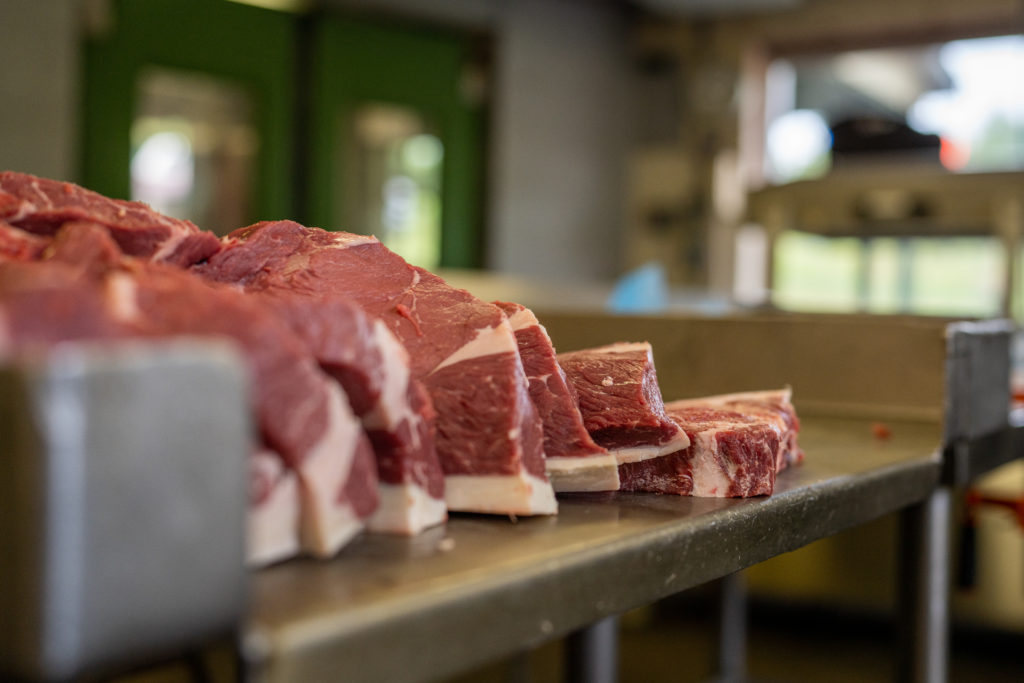
For Immediate Release
Contact:
John McCarthy, Senior Advisor
The Piedmont Environmental Council
[email protected]; 540-347-2334, x7043
WARRENTON, VA. (August 3, 2021) – A recent study by The Piedmont Environmental Council and American Farmland Trust, spurred by pandemic-related breakdowns in national and local food supply systems, has led to the development of a new meat-cutter training program to be offered by the Rappahannock Center for Education beginning late fall 2021. Using a national training model, the program is intended to help local meat processors expand their operations and increase their capacity to serve the region’s cattle farmers by building a larger pool of available skilled laborers in the field.
The training program is one important outcome of a four-month study launched by PEC and conducted in partnership with AFT in response to the effects of the Covid-19 pandemic on the local food supply system. “When the pandemic shut down many national meat processors, smaller Piedmont-area processors found themselves in such demand that they were operating at 125 to 150 percent capacity. Storage limitations and lack of sufficient skilled laborers in the field made it impossible to keep up. As a result, local cattle farmers faced 12- to 18-month waits to get their product processed and to market,” said PEC Senior Adviser John McCarthy.
“The pandemic revealed many vulnerabilities in the national food supply chain—vulnerabilities that are unacceptable in a region with some of the most productive agricultural soils in the country. Part of PEC’s mission for the last 50 years has been to protect and promote the Piedmont’s agricultural economy. This breakdown in our local food supply presented an opportunity and a responsibility to scope out the problem and provide some viable solutions,” McCarthy said.
With funding from the Prince Charitable Trusts, PEC hired Fuller Consulting, a nationally recognized expert on animal processing operations. Fuller, PEC and AFT visited every one of the seven operating USDA-certified animal processing facilities in the region—in Winchester, Stephens City, Middletown, Harrisonburg, Lexington, Bealeton and Lynchburg—documenting their operations, capacities, staffing, challenges and opportunities. “One challenge that each and every processor reported was access to trained labor. Trained meat cutters are in high demand and short supply, and bringing untrained people in to fill these roles forces slowdowns in operations and safety concerns,” McCarthy said.
Processors shared that these relatively high-paying jobs require a fair amount of physical strength and precision with cutting tools and machines and that skills imparted in training or on the job are very necessary to responsibly process carcasses. As a direct outgrowth of this study, AFT and PEC are working with the Rappahannock Center for Education to develop a meat-cutter training program, expected to be offered in late fall 2021.
“This is a logical extension of our workforce training programs, which provide training in areas of high employment needs,” said Rappahannock Center for Education CEO Doug Schiffman. “We are particularly excited to be able to work with local farmers and meat processors to help alleviate the backups in processing caused by employment shortages. Our first training class will begin in late fall 2021, with an anticipated enrollment of six to ten students.”
Jacob Gilley, who is a cattle farmer himself as well as AFT’s mid-Atlantic sustainable grazing manager said, “It’s great to see PEC, AFT, the Rappahannock Center for Education, Virginia Tech and other organizations in Virginia working together to overcome these very real challenges for not only local producers like myself, but for the entire local food system so that consumers can continue to have access to locally produced delicious, healthy and safe food.”
Another outcome of the study is PEC’s development of an interactive asset map of local processors, accessible on PEC’s website at: https://processing.pecva.org/. Building on the tradition of PEC’s Buy Fresh Buy Local guide, which helps connect community members with local farms and food, this asset map will provide Piedmont beef farmers a one-stop resource with locations, contacts, and operations information on all the processors surveyed. “Our hope is that this will streamline producers’ access and throughput so they can get on with the business of raising high quality local beef for consumers,” added McCarthy
The survey also resulted in concrete suggestions for expansion potential at two facilities. In these cases, Fuller was able to provide detailed plans for equipment acquisition and process modifications that would increase production from 15 percent to as much as 50 percent. These process analysis and “de-bottlenecking” suggestions may be useful to both facilities in applying for just-announced USDA grants to expand smaller processing operations.
Building on the success of PEC’s survey of Piedmont-area meat processors, Virginia Polytechnic Institute and Virginia State University are now embarking on a statewide survey of all meat processors in the commonwealth. They have also expressed interest in offering the proposed meat cutter training program that PEC and AFT have under development, for deployment throughout the state.
#####
Since 1972, The Piedmont Environmental Council has proudly promoted and protected the natural resources, rural economy, history and beauty of the Virginia Piedmont. PEC empowers residents to protect what makes the Piedmont a wonderful place, and works with citizens to conserve land, improve air and water quality and build thriving communities. PEC is a 501(c)(3) non-profit and accredited land trust. Learn more at www.pecva.org
